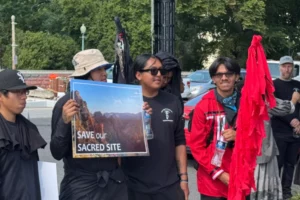
Members and supporters of a Native American coalition from Arizona gathered outside the Supreme Court on Wednesday to hold a prayer circle, hoping to compel the justices to hear their case, which could have significant implications for religious freedom in the United States.
The case, Apache Stronghold v. United States, centers on Oak Flat, a sacred site in Arizona where the Apache people have worshipped for generations. The land is currently at risk of being transferred to a foreign mining company, which plans to destroy it in search of copper, a move the Apache argue would violate their religious rights.

Oak Flat has been protected by the federal government for decades, allowing the Apache to conduct their religious ceremonies there. However, a land transfer deal in 2014, facilitated through a last-minute legislative rider, opened the door for Resolution Copper, a mining company jointly owned by companies based in Australia and the United Kingdom, to take ownership of the land and start mining operations. The company’s plan would create a massive crater, effectively destroying the sacred site.
“The government’s position in the case is it can do whatever it wants on what’s now federal land,” said Luke Goodrich, senior counsel for the Becket Fund for Religious Liberty, which is representing Apache Stronghold.
“And as long as it’s government land, nobody can say a word about it,” Goodrich added.
The legal battle has been ongoing, and most recently, the U.S. Court of Appeals for the 9th Circuit denied the Apache group’s request for a full hearing by the court’s 29-judge panel. Five judges dissented, leading Apache Stronghold to turn to the Supreme Court as its last hope.
As part of an effort to convince the Supreme Court to take up this case, around 100 activists in opposition to the copper mine plan gathered outside the building in Washington, D.C., to say a prayer just before attorneys with Becket filed the petition.
Apache Stronghold, a nonprofit organization based in San Carlos, Arizona, has led the legal and grassroots battle to save Oak Flat. The group began a prayer journey across the country on July 12, visiting religious sites and gathering support for its cause. This journey culminated in Washington, D.C., outside the Supreme Court on Wednesday, where it hoped its prayers and demonstration would move the justices to hear its case.
Mark Rienzi, CEO of the Becket Fund, recently emphasized during a press call the importance of Oak Flat to the Apache people, comparing it to a cathedral or holy site.
“It is outrageous for any court to claim that blowing up a sacred site does not burden the religion of the Apaches,” Rienzi said, criticizing the lower court rulings.
He pointed out that under the Religious Freedom Restoration Act of 1993, the courts should weigh whether the government has a compelling reason to destroy the site, but instead, they have ruled that it presents no burden at all.
If the Supreme Court decides to hear the case, it could set a precedent for claims under RFRA, particularly for indigenous groups or religious groups seeking to protect their lands or worship sites.
In Lyng v. Northwest Indian Cemetery Protective Ass’n (1988), the Supreme Court ruled that the Free Exercise Clause does not grant religious groups the legal authority to prevent government activities related to sacred sites. This decision came during a period when, following Sherbert v. Verner but before Employment Division v. Smith, the high court interpreted the Free Exercise Clause as offering a presumptive right to religious exemptions from generally applicable laws. However, a long-standing debate remains over whether RFRA should be interpreted as upholding the principles established in Lyng or as overturning them, along with other rulings from the Sherbert era.
Becket’s CEO said he believes the case will challenge how RFRA is applied in situations where religious rights clash with economic and governmental interests.
“I think it’s outrageous, frankly, for the federal government to claim, or any judges to claim, that it is not a burden on the religion of the Apaches to blow up their sacred site,” Rienzi said.
Tom Nowlan, an associate director for Resolution Copper, told the Washington Examiner that, in his view, the case “does not present any question worthy of Supreme Court review, as the Ninth Circuit simply applied well-established Supreme Court precedent.”
“This case is about the government’s right to pursue national interests with its own land — an unremarkable and longstanding proposition that the Supreme Court and other courts have consistently reaffirmed,” Nowlan added.
Resolution Copper’s project in Arizona is estimated to supply nearly one-quarter of the United States’s copper needs and is projected to add a billion dollars a year to Arizona’s economy and create local jobs, Nowlan said.
“Our dialogue with local Native American Tribes and communities will continue to shape the project,” he added.
CLICK HERE TO READ MORE FROM THE WASHINGTON EXAMINER
The Supreme Court typically receives thousands of petitions every year, and in recent years, it has taken up an average of around 60 cases each term.
However, the justices have shown an interest in taking more religious liberty cases and have ruled in favor of religious freedom advocates in disputes surrounding a public school football coach praying at the mid-field and a former U.S. Postal Service worker who faced pushback from his former employer over his objections to working on Sundays.






